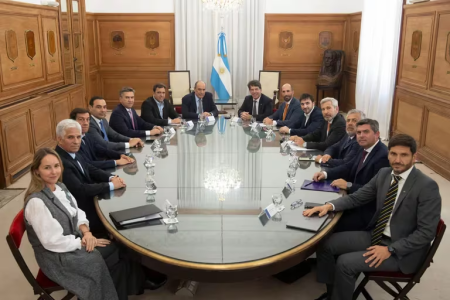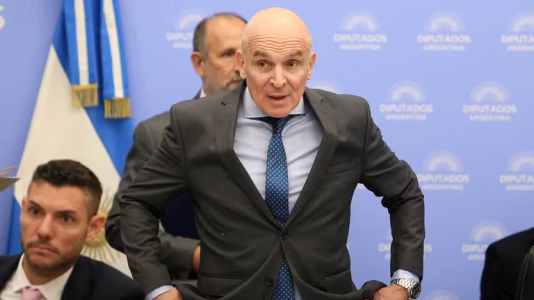All the Answers
Well-known member
The Government sent the fiscal package to Congress: it includes Profits, Personal Assets and money laundering - Infobae

Source:
April 17, 2024
The initiative will be debated simultaneously with the Omnibus Law. The ruling party hopes to have both projects approved in the Chamber of Deputies by early May
By Federico Millenaar

Guillermo Francos and Nicolás Posse received the governors at the Casa Rosada
This afternoon the Casa Rosada sent to Congress the project with the fiscal package that will be debated in Deputies simultaneously with the Omnibus Law. The ruling party hopes to have both initiatives approved in the first days of May to be able to submit them to the Senate and have them sanctioned before the 25th of that same month, the date on which it aspires to sign the May Pact on State policies with the provinces.
The debate will begin this Thursday at 11 with an information meeting of the Budget commission , chaired by José Luis Espert, in which the Secretary of the Treasury Carlos Guberman and José Salim , director of Audit of the AFIP, will present.
According to the text of the project, "the National State is obliged to balance its fiscal accounts, and to do so it must rely on two fundamental pillars: the reduction of public spending and the improvement in tax collection ."
Among the most salient points is the reversal of the fourth category of the Income Tax , which after several rounds of negotiation with the governors and the dialogue opposition blocs, will have a non-taxable minimum of $1,800,000 gross for singles and at $2,200,000 for those married with children .
In addition, the tax will be renamed the Personal Income Tax and will be updated annually starting in 2025 by the Consumer Price Index (CPI).

Jose Luis Espert in the Budget Commission
Regarding the tax moratorium and money laundering , the ruling party argued that the Argentine tax system registers “one of the highest rates of fiscal pressure in the world” and noted that “the existence of numerous distorting taxes makes it difficult and marginalizes many individuals.” , companies and ventures in the formal sector.”
In this sense, they explained that the proposed reforms “are intended to directly address the complex scenario mentioned above, offering options to reincorporate taxpayers who choose to join the formal economy and alleviating the country's financial situation by making the immediate collection of taxes owed or omitted.”
The moratorium will allow tax debts to be regularized in 84 installments and, depending on the way in which the payment is made, delinquent taxpayers will be able to benefit from the total forgiveness of fines and up to 70% of the interest on the balances owed.
The Asset Regularization Regime will enable the laundering of up to USD 100,000 without any penalty, with a deadline until April 30, 2025 (extendable until July 31, 2025) . Even above that figure, the rate will also be 0% if certain conditions are met.
Meanwhile, there will also be modifications to the Personal Property Tax : a reward for compliers, a payment facility to anticipate payments for future years and a reduction in rates in the future.
In the text of the project, it states that the current rate of 2.25 “is excessive in light of the constitutional guarantees of contributory capacity and non-confiscation that govern our tax system, since in many cases it would imply the absorption of a substantial part of the income. of the encumbered assets and could even result in the gradual loss of income-producing capital.”
The new tax floor will be $100 million and the deduction for family housing will increase to $350 million.

The Minister of Economy, Luis Caputo
The reward for those who comply will be that the rates that range between 1.25% and 1.5% will be reduced to 1% and 1.25%, respectively. In order to qualify as a compliant taxpayer, that person must not have entered into laundering, must have submitted “in a timely manner” the sworn declarations of Personal Assets for 2020, 2021 and 2022 and have paid that amount to AFIP before November 30, 2023. .
On the other hand, for sworn declarations with assets until the end of 2023 the rates will be, as expected, between 0.5% and 1.50 percent . Between 2024 and 2026, only two rates would remain in force, between 1.25% and 1.50% , and from 2027, a single rate of 0.25 percent.
In addition, the Executive Branch will propose a scheme for advance payment of the tax for the amounts that correspond to the coming years, until 2027. This is the Special Income Regime of the Tax on Personal Property (“Reibp”), with a reduced rate of 0.45% per year (2.25% in total) the articles require.
The Simplified Regime for Small Taxpayers (Monotributo) updates the billing and quota ceilings, with increases of between 300% and 330%. The maximum annual income would be $68 million, with the novelty that it will be for commercial and service activities alike.
If the project on which the Government is strongly betting is approved, monotributistas with lower incomes registered in category A will be able to invoice up to $6,450,000 annually , while those who are in category K, the highest, will spend 68 million pesos.
Curiously, the project sent today to the Chamber of Deputies bears the signatures of President Javier Milei, the Minister of the Interior Guillermo Francos and his Security counterpart, Patricia Bullrich. The head of the Treasury Luis Caputo and the Chief of Staff Nicolás Posse did not sign the text, as could be expected in a project of these characteristics.



